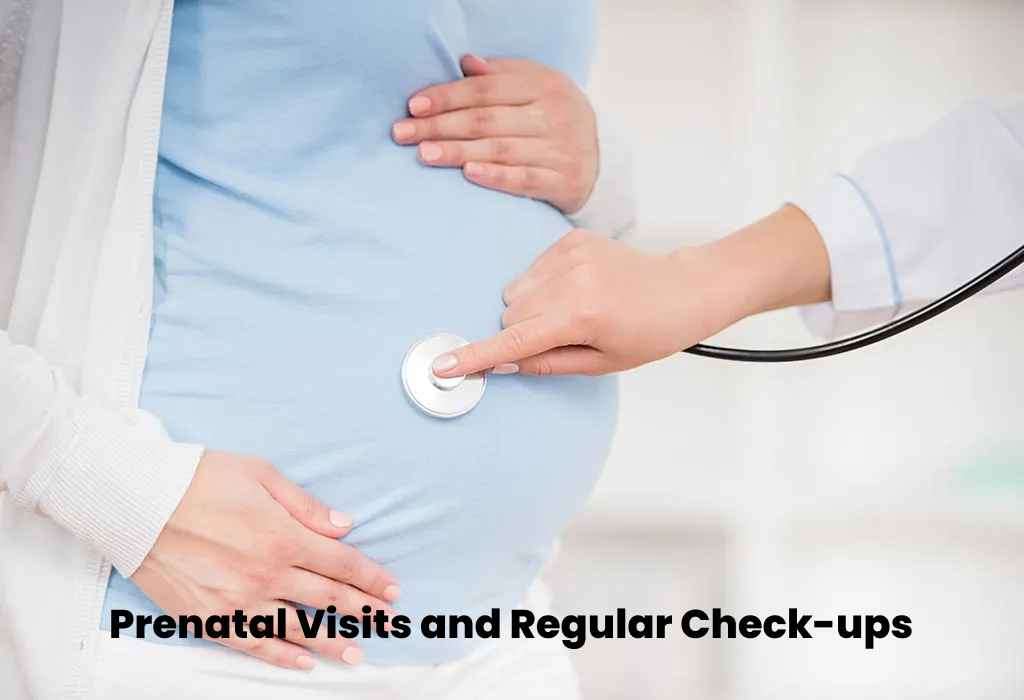Pregnancy care treatment, also known as prenatal care, refers to the
medical care and support provided to women during pregnancy to ensure
the health and well-being of both the mother and the developing baby.
Call us to book a appointment with the gynaecology specialist near you.
Prenatal care begins with early visits to a healthcare provider, such as an obstetrician or midwife, to monitor the progress of the pregnancy. Regular antenatal check-ups allow healthcare professionals to track the baby's growth, evaluate the mother's health, and address any concerns or complications that may arise. These visits typically involve physical examinations, ultrasounds, blood tests, and discussions about health habits and preparations for childbirth.

Prenatal care begins with early visits to a healthcare provider, such as an obstetrician or midwife, to monitor the progress of the pregnancy. Regular antenatal check-ups allow healthcare professionals to track the baby's growth, evaluate the mother's health, and address any concerns or complications that may arise. These visits typically involve physical examinations, ultrasounds, blood tests, and discussions about health habits and preparations for childbirth.
A well-balanced and nutritious diet is crucial during pregnancy. Expectant mothers should focus on consuming a variety of foods that provide essential nutrients, including folic acid, iron, calcium, and omega-3 fatty acids. It is recommended to incorporate fruits, vegetables, whole grains, lean proteins, and healthy fats into daily meals. Adequate hydration is also essential. Consulting with a healthcare professional or a registered dietitian can help develop a personalized pregnancy meal plan that meets specific nutritional needs.

A well-balanced and nutritious diet is crucial during pregnancy. Expectant mothers should focus on consuming a variety of foods that provide essential nutrients, including folic acid, iron, calcium, and omega-3 fatty acids. It is recommended to incorporate fruits, vegetables, whole grains, lean proteins, and healthy fats into daily meals. Adequate hydration is also essential. Consulting with a healthcare professional or a registered dietitian can help develop a personalized pregnancy meal plan that meets specific nutritional needs.
Maintaining regular physical activity during pregnancy offers numerous benefits, including improved circulation, reduced discomfort, enhanced mood, and increased stamina for labor. Moderate-intensity exercises, such as walking, swimming, prenatal yoga, and low-impact aerobics, are generally safe for most pregnant women. However, it is essential to consult with a healthcare provider before starting or continuing an exercise routine, as individual circumstances may require modifications or specific recommendations.

Maintaining regular physical activity during pregnancy offers numerous benefits, including improved circulation, reduced discomfort, enhanced mood, and increased stamina for labor. Moderate-intensity exercises, such as walking, swimming, prenatal yoga, and low-impact aerobics, are generally safe for most pregnant women. However, it is essential to consult with a healthcare provider before starting or continuing an exercise routine, as individual circumstances may require modifications or specific recommendations.
Pregnancy can bring about a range of emotions, and it is important for expectant mothers to prioritize their emotional well-being. It is common for women to experience mood swings, anxiety, or stress during pregnancy. Engaging in activities that promote relaxation, such as prenatal yoga, meditation, deep breathing exercises, or seeking support from loved ones, can help manage emotional fluctuations. If persistent feelings of sadness or anxiety occur, it is crucial to reach out to a healthcare professional for guidance and support.

Pregnancy can bring about a range of emotions, and it is important for expectant mothers to prioritize their emotional well-being. It is common for women to experience mood swings, anxiety, or stress during pregnancy. Engaging in activities that promote relaxation, such as prenatal yoga, meditation, deep breathing exercises, or seeking support from loved ones, can help manage emotional fluctuations. If persistent feelings of sadness or anxiety occur, it is crucial to reach out to a healthcare professional for guidance and support.
Throughout pregnancy, women may experience various discomforts and concerns. Some common issues include morning sickness, backaches, fatigue, constipation, and swollen ankles. Open communication with healthcare providers is crucial to address these concerns and receive appropriate guidance and management strategies. It is important to remember that every pregnancy is unique, and seeking professional advice can help alleviate worries and ensure a healthy pregnancy.

Throughout pregnancy, women may experience various discomforts and concerns. Some common issues include morning sickness, backaches, fatigue, constipation, and swollen ankles. Open communication with healthcare providers is crucial to address these concerns and receive appropriate guidance and management strategies. It is important to remember that every pregnancy is unique, and seeking professional advice can help alleviate worries and ensure a healthy pregnancy.
In addition to the aforementioned aspects, other elements of comprehensive pregnancy care include adequate rest and sleep, maintaining proper hygiene, avoiding harmful substances such as alcohol, tobacco, and drugs, and practicing proper prenatal hygiene, such as taking prenatal vitamins and avoiding potentially harmful medications. Postpartum care: The postpartum period, often referred to as the "fourth trimester," is a critical time for mothers to focus on self-care and recovery after childbirth. During this period, the body undergoes significant physical and emotional changes as it adjusts to the demands of motherhood. Proper postpartum care is essential for the well-being and recovery of mothers. Self-Care and Physical Healing:
After giving birth, it is crucial for mothers to prioritize self-care and allow their bodies time to heal. Rest and adequate sleep are essential during this period, as the body requires time to recover from the physical exertion of labor and delivery. Eating a nutritious diet, staying hydrated, and taking prescribed postpartum supplements can support the body's healing process. It is important to follow any postpartum care instructions provided by healthcare professionals, including proper wound care for cesarean deliveries. Emotional Well-being and Mental Health:
The postpartum period can bring about a range of emotions for new mothers. Hormonal changes, sleep deprivation, and adjusting to the demands of caring for a newborn can contribute to mood swings, baby blues, or even postpartum depression. It is crucial for mothers to prioritize their emotional well-being and seek support when needed. Openly discussing emotions with loved ones, joining support groups, or seeking professional help from healthcare providers or mental health specialists can provide valuable support and guidance. Breastfeeding Support:
If a mother chooses to breastfeed, it is essential to seek proper guidance and support. Breastfeeding can be a rewarding and bonding experience, but it may also come with challenges. Engaging the help of a lactation consultant or joining breastfeeding support groups can provide valuable information, tips, and techniques to navigate common breastfeeding concerns, such as latching difficulties, nipple soreness, or low milk supply. Remember, seeking support and knowledge can help create a positive and successful breastfeeding experience.
Physical Activity and Exercise:
Engaging in gentle postpartum exercises, as recommended by healthcare professionals, can promote physical healing and strengthen the body. Pelvic floor exercises, such as Kegels, can aid in restoring pelvic muscle tone and reducing the risk of urinary incontinence. Gradually incorporating low-impact exercises, such as walking or postnatal yoga, can help improve strength and overall well-being. However, it is important to consult with healthcare providers before starting any exercise regimen to ensure it is safe for individual circumstances. Seeking Help and Support:
The postpartum period can be both joyous and challenging, and it is essential for mothers to recognize when they need assistance. Seeking help from family members, friends, or support groups can provide practical and emotional support. Additionally, if mothers experience symptoms of postpartum depression or anxiety, it is crucial to reach out to healthcare providers for a proper evaluation and treatment plan. Remember, seeking help is a sign of strength and prioritizing both maternal and infant well-being.

In addition to the aforementioned aspects, other elements of comprehensive pregnancy care include adequate rest and sleep, maintaining proper hygiene, avoiding harmful substances such as alcohol, tobacco, and drugs, and practicing proper prenatal hygiene, such as taking prenatal vitamins and avoiding potentially harmful medications.
Postpartum care: The postpartum period, often referred to as the "fourth trimester," is a critical time for mothers to focus on self-care and recovery after childbirth. During this period, the body undergoes significant physical and emotional changes as it adjusts to the demands of motherhood. Proper postpartum care is essential for the well-being and recovery of mothers.
Self-Care and Physical Healing:
After giving birth, it is crucial for mothers to prioritize self-care and allow their bodies time to heal. Rest and adequate sleep are essential during this period, as the body requires time to recover from the physical exertion of labor and delivery. Eating a nutritious diet, staying hydrated, and taking prescribed postpartum supplements can support the body's healing process. It is important to follow any postpartum care instructions provided by healthcare professionals, including proper wound care for cesarean deliveries.
Emotional Well-being and Mental Health:
The postpartum period can bring about a range of emotions for new mothers. Hormonal changes, sleep deprivation, and adjusting to the demands of caring for a newborn can contribute to mood swings, baby blues, or even postpartum depression. It is crucial for mothers to prioritize their emotional well-being and seek support when needed. Openly discussing emotions with loved ones, joining support groups, or seeking professional help from healthcare providers or mental health specialists can provide valuable support and guidance.
Breastfeeding Support:
If a mother chooses to breastfeed, it is essential to seek proper guidance and support. Breastfeeding can be a rewarding and bonding experience, but it may also come with challenges. Engaging the help of a lactation consultant or joining breastfeeding support groups can provide valuable information, tips, and techniques to navigate common breastfeeding concerns, such as latching difficulties, nipple soreness, or low milk supply. Remember, seeking support and knowledge can help create a positive and successful breastfeeding experience.
Physical Activity and Exercise:
Engaging in gentle postpartum exercises, as recommended by healthcare professionals, can promote physical healing and strengthen the body. Pelvic floor exercises, such as Kegels, can aid in restoring pelvic muscle tone and reducing the risk of urinary incontinence. Gradually incorporating low-impact exercises, such as walking or postnatal yoga, can help improve strength and overall well-being. However, it is important to consult with healthcare providers before starting any exercise regimen to ensure it is safe for individual circumstances.
Seeking Help and Support:
The postpartum period can be both joyous and challenging, and it is essential for mothers to recognize when they need assistance. Seeking help from family members, friends, or support groups can provide practical and emotional support. Additionally, if mothers experience symptoms of postpartum depression or anxiety, it is crucial to reach out to healthcare providers for a proper evaluation and treatment plan. Remember, seeking help is a sign of strength and prioritizing both maternal and infant well-being.
The cost of prenatal care can vary depending on several factors, including the location and reputation of the healthcare facility, the expertise of the healthcare providers, the frequency of prenatal visits, the need for additional tests or procedures, and the region or city in which the care is sought. Prenatal care typically includes regular check-ups, screenings, and consultations with healthcare providers to monitor the progress of the pregnancy, provide necessary medical guidance, and address any concerns or complications that may arise. Here is an approximate cost range for prenatal care in various Indian cities:
|
Serial No |
City |
Minimum Cost (INR) |
Average Cost (INR) |
|
1 |
Mumbai |
5,000 |
25,000 |
|
2 |
Delhi |
4,000 |
20,000 |
|
3 |
Bangalore |
3,500 |
18,000 |
|
4 |
Chennai |
3,000 |
15,000 |
|
5 |
Kolkata |
3,000 |
15,000 |
|
6 |
Hyderabad |
2,500 |
12,000 |
|
7 |
Pune |
2,500 |
12,000 |
|
8 |
Ahmedabad |
2,000 |
10,000 |
|
9 |
Jaipur |
2,000 |
10,000 |
|
10 |
Chandigarh |
1,800 |
9,000 |
|
11 |
Lucknow |
1,800 |
9,000 |
|
12 |
Indore |
1,500 |
8,000 |
|
13 |
Kochi |
1,500 |
8,000 |
|
14 |
Coimbatore |
1,200 |
6,000 |
|
15 |
Bhopal |
1,200 |
6,000 |
|
16 |
Nagpur |
1,000 |
5,000 |
|
17 |
Goa |
1,000 |
5,000 |
|
18 |
Mangalore |
800 |
4,000 |
|
19 |
Trivandrum |
800 |
4,000 |
|
20 |
Guwahati |
600 |
3,000 |
|
Serial No |
Hospital Name |
Address |
Contact Number |
|
1 |
All India Institute of Medical Sciences (AIIMS) |
Ansari Nagar, Aurobindo Marg, New Delhi - 110029 |
+91-11-26588500 |
|
2 |
Lady Hardinge Medical College and Associated Hospitals |
C-604, Shaheed Bhagat Singh Road, Diz Area, Connaught Place, New Delhi - 110001 |
+91-11-23363728 |
|
3 |
King Edward Memorial Hospital |
Acharya Donde Marg, Parel, Mumbai, Maharashtra - 400012 |
+91-22-24107000 |
|
4 |
Government Medical College and Hospital (GMCH) |
Sector 32, Chandigarh - 160030 |
+91-172-2601023 |
|
5 |
Nizam's Institute of Medical Sciences (NIMS) |
Punjagutta, Hyderabad, Telangana - 500082 |
+91-40-23489000 |
|
6 |
Institute of Postgraduate Medical Education and Research (IPGMER) |
244 AJC Bose Road, Bhowanipore, Kolkata, West Bengal - 700020 |
+91-33-22235181 |
|
7 |
Jawaharlal Nehru Medical College (JNMC) |
Nehru Nagar, Belgaum, Karnataka - 590010 |
+91-831-2471350 |
|
8 |
Government Medical College and Hospital (GMCH) |
Sector 32, Chandigarh - 160030 |
+91-172-2601023 |
|
9 |
Sri Ramachandra Institute of Higher Education and Research |
Porur, Chennai, Tamil Nadu - 600116 |
+91-44-24768027 |
|
10 |
Sawai Man Singh Medical College (SMS Medical College) |
JLN Marg, Jaipur, Rajasthan - 302004 |
+91-141-2619020 |
Please Wait..